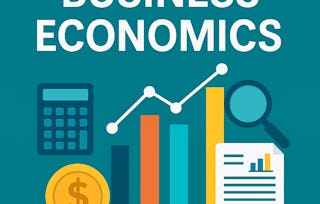Take a trip with me in this the third and final course of this Economics 100 Specialization which is a direct adaptation from one of my courses I teach at Rice University. Specifically, in this course we're going to be focusing on Macroeconomics. What is Macroeconomics you might be asking? Well, you've come to the right place! We're going to be going over the big picture of economics- which is examining the measures we use to gauge the health of national economies and study the theories and policies aimed at improving economic health. In a nutshell, how can we use economics to make the world a better place?

Principles of Economics: Macroeconomics - The Big Picture
6 days left! Gain next-level skills with Coursera Plus for $199 (regularly $399). Save now.

Principles of Economics: Macroeconomics - The Big Picture
This course is part of A Story of Economics: A Principles Tale Specialization

Instructor: James DeNicco
10,829 already enrolled
Included with
(65 reviews)
Recommended experience
Skills you'll gain
Details to know

Add to your LinkedIn profile
68 assignments
See how employees at top companies are mastering in-demand skills

Build your subject-matter expertise
- Learn new concepts from industry experts
- Gain a foundational understanding of a subject or tool
- Develop job-relevant skills with hands-on projects
- Earn a shareable career certificate

There are 9 modules in this course
Welcome, congratulations and thank you for enrolling in this final chapter of our three-part Specialization, Macroeconomics. Please make sure to take look at all the welcome materials (you can skip the Meet the Professor if you've already "met me" two times).
What's included
3 videos4 readings1 discussion prompt
Alrighty then Econ 100. Welcome to Macro Measures. This is our first lecture in Act 3, the big picture. We made it to the big show, Macroeconomics. Here, the first thing we're going to do in macro, we're going to talk about our macro measures. Just like other social sciences, there's two sides of economics, there's the empirical side or the data side. Let's dive in!
What's included
16 videos1 reading15 assignments1 discussion prompt
When we're talking about economic growth, what is the name of the game? The name of the game is raising standards of living. That's what we're trying to do with economic growth. We're trying to take people in difficult situations and give them the tools and the equipment that they need to raise themselves up, put themselves in better situations, and live the lives that they want to live.
What's included
7 videos7 assignments1 discussion prompt
Welcome to labor supply and demand. Now, we've already talked about our labor market measures, our labor market variables. Now, we going to talk about the theory behind the labor market. Now this is macro, but before we get to the macro, we going to take a little trip down memory lane to the world of microeconomics and then we can explore further!
What's included
7 videos7 assignments1 discussion prompt
In this module we're going to be looking at the relationship between... well savings and consumption. We're going to look at how the relationship between the two affects changes in income and interest rates within our two period consumer model. Let's get it.
What's included
6 videos6 assignments1 discussion prompt
When you think savings and investment, you probably think of financial institutions-- You think stocks, bonds, Wall Street, maybe the stock market. That's where this story is taking place. Now remember here in economics, we use the term investment differently than they do in finance. In finance, when you buy stocks and bonds, they call that investment. You're investing in the market in economics when you buy those assets and that's what they are assets, we call that savings. Investment is different for us in economics as you'll see in this module!
What's included
8 videos8 assignments1 discussion prompt
In this module, we're going to be talking about money and monetary policy. Monetary policy, how it's conducted by the Federal Reserve. The control the money supply to affect interest rates, inflation, and employment. And we'll be defining some terms, looking at tools, and exploring their impact. Jump on in!
What's included
10 videos10 assignments1 discussion prompt
Here in aggregate supply and demand we are going to take everything we've done throughout the entire course and we're going to put all the pieces of the puzzle together and look at our aggregate supply and demand graph! It's a bit of a short lesson, but it encompasses a lot of previous knowledge, so you may want to allot some time for review of previous lessons or have your notes handy. Let's check it out!
What's included
6 videos6 assignments1 discussion prompt
Welcome to fiscal policy, this is really government policy. We've talked about monetary policy with the Central Bank, with the Federal Reserve but as I told you, they're an independent institution they're not really part of the government. Here our fiscal policy, that is really government policy, and this is our last hurrah, this is our last lecture in Act 3 the big picture. Can you believe it!?
What's included
8 videos9 assignments1 discussion prompt
Earn a career certificate
Add this credential to your LinkedIn profile, resume, or CV. Share it on social media and in your performance review.
Instructor

Offered by
Explore more from Economics
 Status: Free Trial
Status: Free TrialRice University
 Status: Preview
Status: PreviewO.P. Jindal Global University
 Status: Preview
Status: PreviewO.P. Jindal Global University
 Status: Free Trial
Status: Free TrialRice University
Why people choose Coursera for their career

Felipe M.

Jennifer J.

Larry W.

Chaitanya A.
Learner reviews
- 5 stars
83.07%
- 4 stars
13.84%
- 3 stars
3.07%
- 2 stars
0%
- 1 star
0%
Showing 3 of 65
Reviewed on Oct 12, 2025
It was such an interesting course and well taught!
Reviewed on Dec 28, 2025
A great Economics course taught by an animated Professor that makes the lectures memorable. I highly recommend, you will be extremely pleased.
Reviewed on Aug 1, 2024
The course was so informative and useful. The professor is really talented and explains everything clearly.

Open new doors with Coursera Plus
Unlimited access to 10,000+ world-class courses, hands-on projects, and job-ready certificate programs - all included in your subscription
Advance your career with an online degree
Earn a degree from world-class universities - 100% online
Join over 3,400 global companies that choose Coursera for Business
Upskill your employees to excel in the digital economy
Frequently asked questions
To access the course materials, assignments and to earn a Certificate, you will need to purchase the Certificate experience when you enroll in a course. You can try a Free Trial instead, or apply for Financial Aid. The course may offer 'Full Course, No Certificate' instead. This option lets you see all course materials, submit required assessments, and get a final grade. This also means that you will not be able to purchase a Certificate experience.
When you enroll in the course, you get access to all of the courses in the Specialization, and you earn a certificate when you complete the work. Your electronic Certificate will be added to your Accomplishments page - from there, you can print your Certificate or add it to your LinkedIn profile.
Yes. In select learning programs, you can apply for financial aid or a scholarship if you can’t afford the enrollment fee. If fin aid or scholarship is available for your learning program selection, you’ll find a link to apply on the description page.
More questions
Financial aid available,

